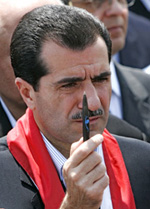On a rainy Sunday in downtown Beirut, in St. George Cathedral at Place d’Etoile, the family of murdered Lebanese journalist Gebran Tueni gathered with the staff of his newspaper, Al-Nahar, to hold a memorial marking the fifth anniversary of Tueni’s assassination. The memorial was held in the same church where Tueni was married in 2001, and where his funeral was held in 2005, as if to complete the circle of life and memory.
Tueni, the managing director and leading columnist for Al-Nahar, was murdered with impunity on December 12, 2005, when a bomb targeted his armored car. During the memorial, the Orthodox bishop of Beirut, Elias Aoude, reminded the group that Tueni, who was also a member of parliament, once said, “We will continue to tell the truth because only the truth makes us free.” Five years after his death, however, the truth about his murder remains unknown.
Tueni’s picture still hangs in CPJ’s office in New York. He wears a red scarf and holds his pen, the powerful weapon with which he sharply criticized Arab regimes, Syrian policies in Lebanon, and Lebanese sectarianism. After the religious ceremony, Tueni’s daughter Michelle said, “Each year passes by us and time stops. Your absence becomes presence and today your presence is stronger than before.” She assured her father that her two younger sisters, Nadia and Gabrielle, have entered school and that they keep asking about him. “I’m also happy to tell you that you have a grandson,” she said. “His name is Gebran.”
There are people, she said, who “advise us to forget, but forgetting you is impossible. There are some who stopped their forward march under the pretext of safety and stability, as if punishing your murderers would be a mistake.”
The daughter’s allusion referred to reports that the U.N.-backed Special Tribunal for Lebanon will issue indictments in the 2005 murder of Rafik al-Hariri against Hezbollah members, which has caused political tension in Lebanon amid fears of the collapse of the unity government; the speaker of the parliament, Nabih Berri, warned in October of civil strife. A 2007 report by the U.N. International Independent Investigation Commission found evidence that Samir Qassir’s and Tueni’s murder might be linked to the al-Hariri assassination. Qassir, an Al-Nahar columnist critical of Syrian influence in Lebanon, was killed in June 2005 when a bomb placed in his car detonated outside his Beirut home.
The choice between safety and truth is a difficult one. But for Michelle Tueni, it is a clear choice, far from the politics of the tribunal. She is a daughter that wants and has the right to see her father’s murderers punished.
